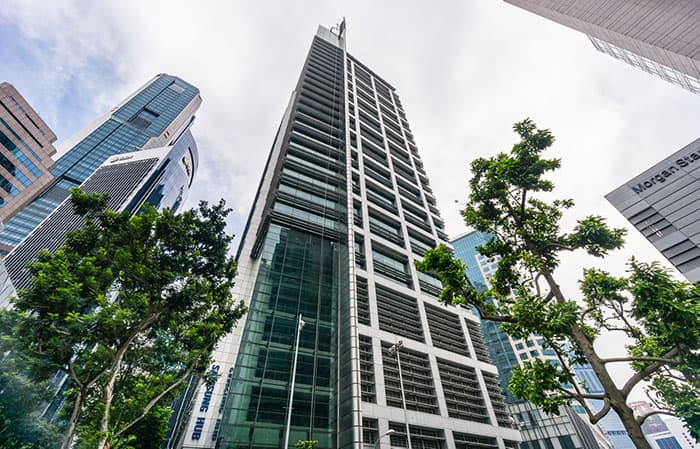
A floor in Samsung Hub was the biggest deal of the quarter
With borrowing costs rising and economic uncertainty growing, real estate investment in Singapore has slumped for a second consecutive quarter with investor commitments to major property purchases dropping 70 percent for the period through 30 September compared to the preceding three months.
A report by Cushman & Wakefield on Thursday showed total investment sales across all sectors dropped to S$4.78 billion ($3.35 billion) in the July through September period from S$16.1 billion booked in the second quarter, and posted a 39 percent decline compared to the S$7.9 billion of transactions closed in the third quarter of last year.
A moribund commercial sector was responsible for much of the plunge in deals, with trades of office and retail assets dropping 95 percent from the second quarter total, as sales of smaller assets like strata offices and shophouses dominated the market and investors backed away from mega-deals requiring large scale borrowing.
“The commercial investment sales market tumbled in Q3 2022 given the scarcity of quality commercial assets amid more challenging market conditions,” said Xian Yang Wong, research head for Singapore at Cushman & Wakefield. “Many property owners / long-term investors would prefer to keep the high-quality assets in their portfolio instead of divesting them, especially during such a volatile environment.”
Investors Turn Cautious
Investment in Singapore’s previously red-hot property sector began to cool in the second quarter when transactions dropped around 30 percent from the S$12 billion in sales posted in the first three months of the year.

Xian Yang Wong, Head of Research, Singapore, Cushman & Wakefield
Despite the slowdown over the past two quarters, overall real estate transactions for the first nine months still hit S$26.9 billion to exceed the S$26 billion recorded in 2021, by 3 percent.
The evaporation of office mega-deals accounted for much of the slowdown in the third quarter with Cushman & Wakefield noting the S$53 million sale of a floor in the Samsung Hub building in Raffles Place to developer Lee Kim Tah Group as one of the largest deals of the period.
Shaun Poh, executive director and head of capital markets at the property consultancy, said investors continue to look for quality commercial assets but demand is now focused on “bite-sized developments or assets such as strata offices or shophouses.”
In a separate report, Knight Frank said there is a “widening gap in price expectations” between sellers and buyers in the sector as owners of commercial assets cling to their valuations and investors hold onto their cash.
“While most owners are under no pressure to sell, the increasingly clouded economic outlook pushed buyers to adopt a cautious stance as fears of a recession spread across the globe,” the report said.
Residential Heats Up
The residential segment accounted for the bulk of real estate deals last quarter with S$3.5 billion in total investments, up 6 percent from the preceding three months, based on Cushman & Wakefield data.
The residential total includes S$1.09 billion from three government land sales in September involving sites at the new Lentor Hills estate as well as a project at Bukit Batok West.
The S$890 million collective sale of the Chuan Park condominium to a JV between Kingsford Development and a unit of state-owned conglomerate Metallurgy Corporation of China in July ranked as the biggest single asset transaction last quarter.
In the industrial segment Cushman & Wakefield reported S$498 million in deals during the quarter, which was a 95 percent drop from the preceding three months.
The shed deals were led by a pair of acquisitions by Ascendas REIT which bought a food storage and distribution centre in western Singapore from PGIM Real Estate for S$191.9 million in September, a month after acquiring Philips’ Asia Pacific headquarters through a sale and lease-back agreement.
Quiet Fourth Quarter Seen
After two straight quarters of slowing transactions, Cushman & Wakefield expects investment in Singapore real estate to cool still further in the fourth quarter due to stronger headwinds, but does not expect asset owners to start lowering prices.
“Capital values are expected to stay robust amid rising rents and strong seller holding power,” it added.
Wong said the challenging environment coupled with a fresh round of cooling measures introduced this month will temper the city-state’s housing market for the rest of the year, but expects that developers may stay active in acquiring sites to build up their landbanks.
The property agency now projects that property investment in the city-state this year will total no more than S$31 billion, down from their prediction last quarter of S$34 billion for all of 2022.
“Amidst rising interest rates and positive rental growth coupled with tight supply, there is a stand-off between vendors and purchasers,” Wong said. “With tighter financing conditions, large ticket deals are increasingly challenging for yield-sensitive investors.”
He added that buying demand from wealthy individuals and family offices should provide a boost to the market as these groups continue to snap up assets for diversification and as a hedge against inflation.
Knight Frank also trimmed its full-year investment forecast for 2022 to no more than S$32 billion, from its July estimate of up to S$35 billion.
Leave a Reply